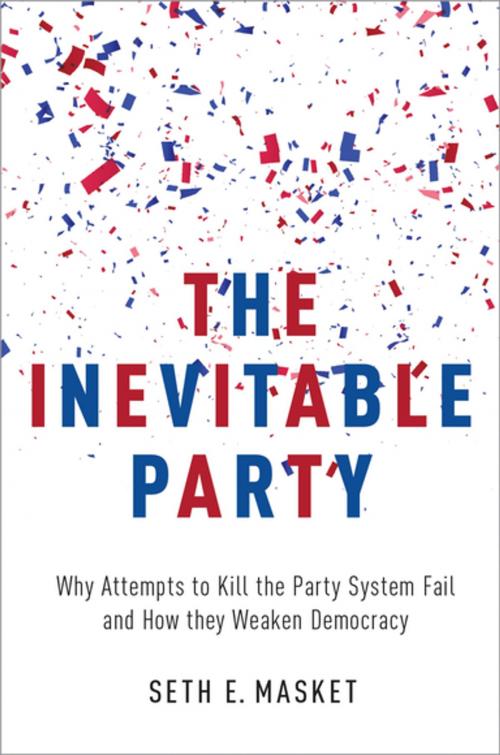The Inevitable Party
Why Attempts to Kill the Party System Fail and How they Weaken Democracy
Nonfiction, Social & Cultural Studies, Political Science, Government, Political Parties, Elections, Democracy| Author: | Seth Masket | ISBN: | 9780190630539 |
| Publisher: | Oxford University Press | Publication: | April 1, 2016 |
| Imprint: | Oxford University Press | Language: | English |
| Author: | Seth Masket |
| ISBN: | 9780190630539 |
| Publisher: | Oxford University Press |
| Publication: | April 1, 2016 |
| Imprint: | Oxford University Press |
| Language: | English |
Seth Masket's The Inevitable Party is a study of anti-party reforms and why they fail. Numerous reform movements over the past century have designated parties as the enemy of democracy, and they have found a willing ally in the American people in their efforts to rein in and occasionally root out parties. Masket investigates several of these anti-party reform efforts - from open primaries to campaign finance restrictions to nonpartisan legislatures - using legislative roll call votes, campaign donations patterns, and extensive interviews with local political elites. These cases each demonstrate parties adapting to, and sometimes thriving amidst, reforms designed to weaken or destroy them. The reason for these reforms' failures, the book argues, is that they proceed from an incorrect conception of just what a party is. Parties are not rigid structures that can be wished or legislated away; they are networks of creative and adaptive policy demanders who use their influence to determine just what sorts of people get nominated for office. Even while these reforms tend to fail, however, they impose considerable costs on society, usually reducing transparency and accountability in politics and government.
Seth Masket's The Inevitable Party is a study of anti-party reforms and why they fail. Numerous reform movements over the past century have designated parties as the enemy of democracy, and they have found a willing ally in the American people in their efforts to rein in and occasionally root out parties. Masket investigates several of these anti-party reform efforts - from open primaries to campaign finance restrictions to nonpartisan legislatures - using legislative roll call votes, campaign donations patterns, and extensive interviews with local political elites. These cases each demonstrate parties adapting to, and sometimes thriving amidst, reforms designed to weaken or destroy them. The reason for these reforms' failures, the book argues, is that they proceed from an incorrect conception of just what a party is. Parties are not rigid structures that can be wished or legislated away; they are networks of creative and adaptive policy demanders who use their influence to determine just what sorts of people get nominated for office. Even while these reforms tend to fail, however, they impose considerable costs on society, usually reducing transparency and accountability in politics and government.















